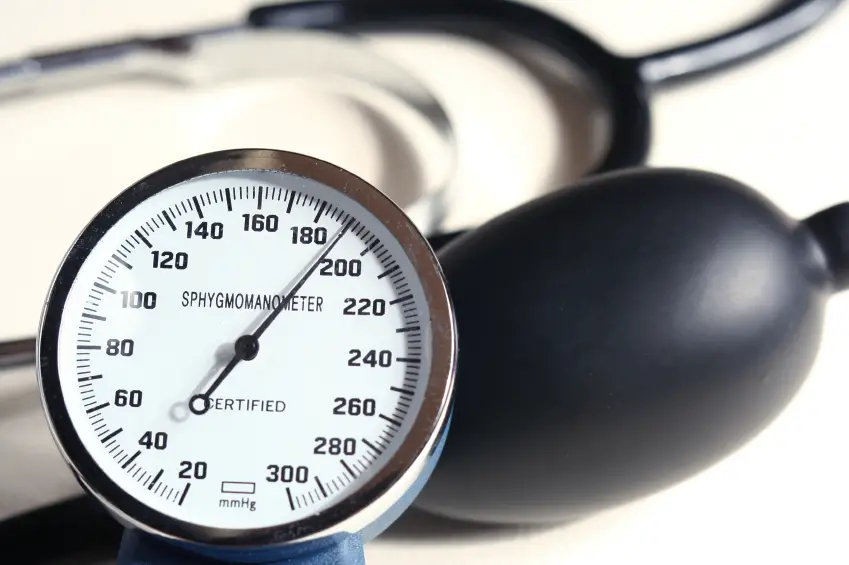Contributing writers for Wake Up World
About 74 million (1 in 3) American adults (20 and over) have high blood pressure (hypertension). From 1995 to 2005, the death rate from high blood pressure increased 25.2 percent, and the actual number of deaths rose 56.4 percent. It was once thought that high blood pressure was a ” man’s disease”; in fact, woman are as likely to suffer from this condition as men are. Interestingly enough, more women than men die from complications of high blood pressure every year. Considering this fact, it is important that both men and women monitor their blood pressure regularly.
Blood pressure is represented as a pair of numbers. This first is the systolic pressure, which is the pressure exerted by the blood when the heart beats, forcing blood into the blood vessels. The second reading is the diastolic pressure, which is recorded when the heart is at rest between beats, when the blood pressure is at its lowest. Both figures represent the height (in millimeters, or mm) that a column of mercury (Hg) reaches under pressure exerted by the blood. The combined blood pressure reading is then expressed as a ratio of systolic blood pressure to diastolic blood pressure, such as 120/80. Figures above these two numbers is considered elevated blood pressure.
Given the amount of people who suffer from this condition, we felt it is was important to share a few tips to help remedy some of the symptoms, and maybe even eradicate the cause.
Natural Remedies for High Blood Pressure
Recommendations:
- Avoid adding salt to your food (even too much high quality full-spectrum salts can have an effect, as they also have sodium). This is essential for lowering blood pressure. Lowering your salt intake may not be enough; for this reason, we suggest that you eliminate all added salt from your diet. Read labels carefully, and avoid products that have salt, soda, sodium, or the symbol Na on the label. Furthermore, it is also necessary to avoid many food additives, including: monosodium glutamate (accent, MSG), also products like baking soda, canned vegetables, commercially prepared foods, over-the-counter medication that contain ibuprofen (such as Advil or Nuprin), diet soft drinks, foods with mold inhibitors, preservatives, sugar substitutes, meat tenderizers, softened water, and soy sauce. We all need sodium, however, too much of it can be detrimental to our health. A proper amount of sodium can be attain by eating a healthy whole foods diet, full of vegetables and fruits.
- Eat a high fibre diet.
- Eat plenty of fruits and vegetables, such as apples, asparagus, bananas, broccoli, cabbage, cantaloupe, eggplant. garlic, grapefruit, green leafy vegetables, melons, peas, prunes, raisins, squash, and sweet potatoes.
- Include plenty of fresh “live” juices in your diet, including, but not limited to, beet, carrot, celery, currant, cranberry, citrus fruit, parsley, spinach, and watermelon.
- Eat grain like quinoa, buckwheat, brown rice, millet, and oats.
- Drink steam-distilled water or natural spring water only.
- Take 2 tablespoons of flaxseed oil daily.
- Avoid animal fats. Bacon, beer, bouillons, chicken liver, corned beef, dairy products, gravies, pork, sausage, and smoked or processed meats are the most damaging. The best animal-based foods are broiled whitefish, and skinless turkey or chicken, and these should be consumed in moderation only. Get protein from vegetable sources, grains and legumes instead.
- Avoid foods such as aged cheeses, aged meats, anchovies, chocolate, fava beans, pickled herring, sherry, sour cream, wine, and yogurt.
- Avoid all alcohol, caffeine, and tobacco.
- If you are taking a MAO inhibitor (one of a class of drugs prescribed to counter depression, lower blood pressure, and treat infections and cancer), avoid the chemical tyramine and its precursor, tyrosine. Combining MAO inhibitors with tyramine causes the blood pressure to soar and could cause a stroke. Check out this list for tyramine containing foods.
- Keep your weight down. Loosing 10 percent of your body weight will reduce blood pressure, and may even allow you to use less medications, if you are currently taking medications – or avoid them altogether, if you are not. Caution: you should not stop taking your medication without consulting a trained practitioner.
- Fast for 3 to 5 days each month. This will help detoxify the body.
- Get regular light to moderate exercise. Take care not to overexert yourself, especially, in hot or humid weather.
- Be sure to get sufficient sleep.
- Have your blood pressure checked every 4 to 6 months.
- Do not take antihistamines except under a physician’s direction.
- Do not take supplements containing the amino acids phenylalanine or tyrosine. Also avoid the artificial sweetener aspartame, which contains phenylalanine.
- Avoid stress as much as possible.
Nutritional Supplementation:
- Calcium citrate: 1500-3000 mg daily (deficiencies have been linked to high blood pressure)
- Magnesium: 750-1000 mg daily
- Potassium: As directed on label (If you are taking high blood pressure medication, take extra potassium to counter depletion of this mineral)
- Coenzyme Q10: As directed on label ( improves heart function)
- Essential fatty-acids: (black current seed oil, flaxseed oil. olive oil, primrose oil – important for circulation and lowering blood pressure)
- Garlic: whole or 2 capsules 3 times daily
- L-arginine: As directed (plays an important role in heart health)
- L-carnitine: 500 mg twice daily, on an empty stomach (transports long fatty acid chains; aids in preventing heart disease)
- L-glutamic acid: 500 mg daily, on an empty stomach
- L-glutamine: take with 50 mg B6 and 100 mg of vitamin C for better absorption
- Selenium: 200 mcg daily (deficiency has been linked dot heart disease)
- Vitamin E: 100 – 200 IU daily ( acts as a blood thinning agent, it also improves heart function)
- Vitamin C: 3000 – 6000 mg daily in divided doses (improves adrenal function, reduces blood clotting)
- Lecithin granules: 1 tbsp 3 times daily (to emulsify fat, improve liver function, and lower blood pressure)
Herbal Remedies:
- Use cayenne, chamomile, fennel, hawthorn berries, parsley, and rosemary for high blood pressure
- Hops and valerian root are good for calming the nerves
- Studies show that mistletoe can reduce symptoms of high blood pressure, especially headaches and dizziness
- Drink 3 cups of suma tea daily
- Avoid licorice, as this herb can elevate blood pressure
High blood pressure is a prevalent condition that affects many people around the world. By eliminating the use of added salt, increasing your intake of fruits and vegetables, and exercising moderately, it is certain that symptoms associated with high blood pressure will improve.
Article Sources:
About the authors:
Jordan & Kyla are passionate about health; together, they have overcome many illnesses through dietary and lifestyle changes, and the art of practicing a positive mindset daily. Kyla is a Registered Holistic Nutritionist and Reiki Master, and Jordan is a Certified Herbalist, whose focus is traditional North American medicinal herbs. For more information, please visit the following sites; guidinginstincts.com, Facebook, Twitter, Google+, or Pinterest

If you've ever found value in our articles, we'd greatly appreciate your support by purchasing Mindful Meditation Techniques for Kids - A Practical Guide for Adults to Empower Kids with the Gift of Inner Peace and Resilience for Life.
In the spirit of mindfulness, we encourage you to choose the paperback version. Delve into its pages away from screen glare and notifications, allowing yourself to fully immerse in the transformative practices within. The physical book enriches the learning process and serves as a tangible commitment to mindfulness, easily shared among family and friends.
Over the past few years, Wake Up World has faced significant online censorship, impacting our financial ability to stay online. Instead of soliciting donations, we're exploring win-win solutions with our readers to remain financially viable. Moving into book publishing, we hope to secure ongoing funds to continue our mission. With over 8,500 articles published in the past 13 years, we are committed to keeping our content free and accessible to everyone, without resorting to a paywall.







